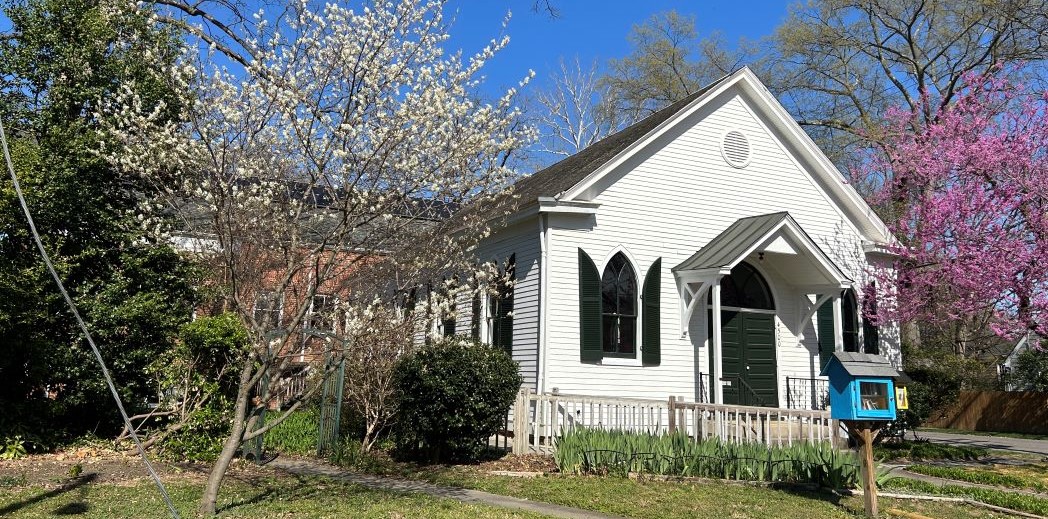March is Women’s History Month as declared by Congress, the Virginia legislature and the Richmond City Council in the 1980s. Thus, we want to share with you this month the stories of 19th century Quaker sisters Lucy and Sarah Chase, Eunice Congdon and Sarah Smiley (photo left), along with others. These women traveled to Virginia during the Civil War to be of assistance. Our thanks to authors Jay Worrell and Linda Selleck for the material presented below.
In 1862 Sarah and Lucy Chase from Worchester, MA arrived in Norfolk, Virginia. Lucy was age 39 and her sister, Sarah, age 25. Right after Union troops got control of the area around Norfolk in December 1862, Lucy and Sarah appeared in their Quaker bonnets. They came as emissaries of the Boston Education Commission. General Ben Butler, military governor of Norfolk, assigned the sisters to work with 2,000 ragged and bewildered Contrabands on Craney Island, six miles from Norfolk.
Craney Island’s muddy crudeness shocked the sisters. Late into the night they heard swelling spirituals sung, the chant and response sermons of black preachers. They survived severe homesickness. Army regulations frustrated them. They scourged for supplies, acted as teachers, nurses, mediators, counselors, and comforters. When a delegation of
New York Friends came to build them a schoolhouse, they were glad.
By early 1864 the Union armies had pushed up the James River from Norfolk halfway to Richmond. A company of eight or nine Friends came then to set up a Contraband area. The newly formed Friends Freedman’s Association of Philadelphia sent them. By this time the Chase sisters were seasoned refugee workers so they were invited to relocate to Slabtown, a new village for 400 refugee black families, near Yorktown.
Here they organized parties of black men to build a community center, a warehouse, and schoolhouses. Other work parties tended truck gardens for Slabtown’s food supply. A medical dispensary was established. Eunice Congdon from New England headed up the Quaker teachers at Slabtown. Lucy was so impressed with the teachers that she wrote home, saying, “The Friends have already done great work here. They have nearly 300 pupils in their day school and a large night school of adults.”
In 1865, within a week of surrender, Lucy and Sarah Chase visited Richmond. Soon they had a school underway in Richmond’s First African Church, enrolling a thousand black children and seventy-five adults.
Sarah Smiley joined the Chase sisters in Richmond to start her industrial school for adults there. She bought nine young Quaker teachers from the north to Richmond. She established a “Teachers’ Home” in Richmond and very likely was the person who established the shelter for abandoned black children that John Crenshaw and Richmond Meeting later made the Friends Asylum for Colored Children. Sarah Smiley joined Richmond Meeting in First Month 1866 and the Meeting later recorded her as a minister.
These Quaker women were among the many, who were excellent representatives of the sort of independent-minded women the Society of Friends were capable of producing in the first half of the 1800s. Their early exposure to religious thinking produced an ability to clearly define and obtain their own spiritual, intellectual, and professional needs. They had learned to coexist in the midst of controversy with dry charm and flexibility.
These women were not without friendly encouragement. From a distance their enlightened sisters steadily maintained personal communication and financial aid. Numerous northern-based support groups of Quaker women corresponded regularly with their transplanted Friends. Over the years, their contributions of funds enabled the women to focus immense energies into the cause of black assistance, despite the lack of white fellowship found in most southern communities.
SOURCES:
Selleck, Linda B. Gentle Invader:” Quaker Women Educators and Racial Issues During the Civil War and Reconstruction. Athens, GA, Friends United Press, 1995.
Worrall, Jay, Jr. The Friendly Virginians: America’s First Quakers. Charlottesville, VA, Iberian Publishing Company, 1994.
